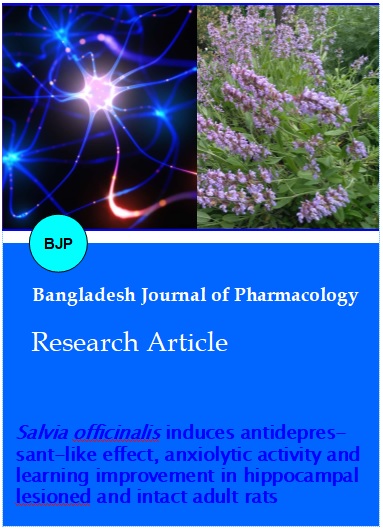Salvia officinalis induces antidepressant-like effect, anxiolytic activity and learning improvement in hippocampal lesioned and intact adult rats
DOI:
https://doi.org/10.3329/bjp.v13i4.38375Keywords:
Anxiolytic, Antidepressant, Salvia officinalisAbstract
The anxiolytic and antidepressant like effects of Salvia officinalis extract (50, 100 and 200 mg/kg) were evaluated using marble burying, forced swimming and open-field tests in intact and hippocampal lesioned rats. Additionally, S. officinalis was evaluated on rat's memory using conditioned learning test. and we screened the methanolic extract for anti-oxidant activity, phytochemical and high performance liquid chromatography analyses. The administration of sage extract showed a significant reduction of immobility time in lesioned and intact animals during the forced swim test and anxiolytic effect in marble burying test. In the case of conditioned learning paradigm, memory enhancement was observed in sage treated group which indicates a cognition improvement. These activities seem to be related to the anti-oxidant capacity and the phytochemicals (phenolic, flavonoid, and tannin) detected into the extract of S. officinalis. The findings show that the methanolic extract of sage possess antidepressant-like effect, anxiolytic activity and also may contain bioactive compounds that stimulate learning in rat.
Downloads
329
266 Read
66

Published
How to Cite
Issue
Section
License
Authors who publish with this journal agree to the following terms:
- Authors retain copyright and grant the journal right of first publication with the work simultaneously licensed under a Creative Commons Attribution License that allows others to share the work with an acknowledgement of the work's authorship and initial publication in this journal.
- Authors are able to enter into separate, additional contractual arrangements for the non-exclusive distribution of the journal's published version of the work (e.g., post it to an institutional repository or publish it in a book), with an acknowledgement of its initial publication in this journal.
- Authors are permitted and encouraged to post their work online (e.g., in institutional repositories or on their website) prior to and during the submission process, as it can lead to productive exchanges, as well as earlier and greater citation of published work (See The Effect of Open Access).
